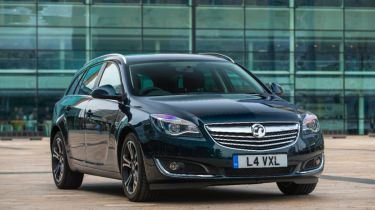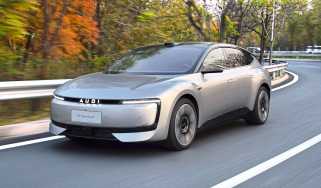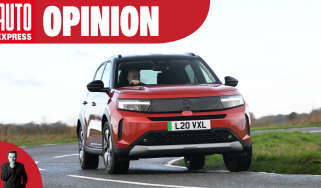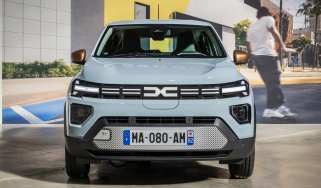Vauxhall Insignia Sports Tourer (2008-2016) review
The Vauxhall Insignia Sport Tourer is a sleek and stylish rival to family estates like the Ford Mondeo and Skoda Superb

The Vauxhall Insignia Sports Tourer was introduced in 2008 to replace the ageing Vectra estate. It was a huge leap forward in terms of the way it drove and the way it looked - although the Insignia didn't quite match the outgoing Vectra's practicality.
In 2013, a thorough facelift inside and out has helped maintain the Insignia's position as one of the best-looking cars in its class, while also adding new interior technology and frugal diesel engines that are great for fleet buyers.
All models come well equipped, too, and there are lots of engines and trim levels to choose from. The facelifted model also allowed Vauxhall to rejig Insignia Sports Tourer, reducing prices and stock levels to help improve the car's rather average residual values.
Engines, performance and drive
Despite the sporty looks, the Insignia ST isn't the best family estate to drive. The steering is light, the CDTi diesels are quite noisy and there's more wind and road noise than you'd expect. It is comfortable, though, thanks to supportive seats an an adjustable driving position, but the ride is a bit firm on SRi and ecoFLEX models, which get lowered and stiffened suspension.
There's a large choice of engines to choose from and the option of a four-wheel drive system. Petrols include an entry-level 1.4-litre, a punchy 245bhp 2.0-litre turbocharged unit and a sporty VXR version, which is powered by a 2.8-litre V6 and can go from 0-62mph in 5.9 seconds.
Used - available now

2024 BMW
1 Series
54,015 milesAutomaticPetrol1.5L
Cash £17,800
2022 Volkswagen
ID.3
39,947 milesAutomaticElectric
Cash £13,300
2021 Nissan
Leaf
32,898 milesAutomaticElectric
Cash £8,700
2020 Volkswagen
Tiguan
51,794 milesAutomaticPetrol2.0L
Cash £19,300If you're a fleet buyer, the latest 1.6-litre 'CDTi Whisper' diesel is the best choice as it combines a decent 134bhp with CO2 emissions of just 104g/km. It's not the quickest car, but with a healthy 320Nm of torque at 2,000rpm it delivers effortless mid-range acceleration. And while it's not quite as quiet as its 'Whisper' name tag would have you believe, it delivers decent refinement, particularly at a cruise.
There's also the tried and tested 2.0-litre CDTi diesel that's no available exclusively in 167bhp guise. It's not quite as smooth as the 1.6-litre diesel and in the real world it doesn't feel much faster, despite a claimed 0-62mph time of 9.9 seconds, which is 1.5 seconds quicker than the smaller diesel.
The entry-level 1.4-litre turbo petrol feels remarkably strong for such a small engine in a such a big car. With a healthy 200Nm of torque at just 1,850rpm, it pulls strongely from low revs and delivers decent smoothness. However, the 245bhp 2.0-litre is far more potent, and for many buyers it will be fast enough to consider in place of the pricier and thirstier VXR. That said, the flagship model's twin turbocharged V6 is in another league when it comes to all out performance, plus it delivers a characterful growl at high revs that the four-cylinder models can't match.
MPG, CO2 and Running Costs
The ecoFLEX models are the most efficient versions, and thus the best bet for company car buyers. Thanks to a stop-start system, the 2.0-litre diesel will return 62.8mpg and emit 119g/km of CO2. However, if your looking to keep your motoring bills in check, then the 1.6-litre CDTi is the best bet. With CO2 emissions of as 104g/km and claimed economy of 72.4mpg it shames much smaller cars when it comes to running costs. Factor in the car's competitive pricing, and this engine makes the Insignia a remarkably cost effective choice for business users.
The 1.4-litre petrol manages 50.0mpg and 134g/km, while the sporty VXR version manages 27.0mpg and 249g/km. The 2.0-litre petrol with a claimed 39.2mpg at the pumps and C02 emissions 169g/km.
The Insignia ST is a bit more expensive to buy than the saloon or hatchback versions, though, and residual values won't be as strong as those for cars like the Skoda Superb. That said, Vauxhall slashed the prices of most models by around £2,000 when it was facelifted in 2013, and as a result the Insignia represents strong value for money.
Insurance groups
The Insignia has keen insurance group classifications by class standards, which should help to keep costs low. The popular 1.6 CDTi ecoFLEX sits in either group 17E or 18E, while the 1.4T model starts in group 15E. The 2.0-litre diesel falls into group 23E and the punchy 2.0-litre petrol is only three groups higher. Don’t expect the 2.8 VXR to be cheap to insure, though: it sits in group 36E.
Depreciation
A lack of badge kudos and the fact that big savings are available new means that the Insignia doesn’t hold on to its value well – in fact, it’s one of the weakest performers on the market in terms of residuals. So when buying new, you need to ensure you negotiate a large discount. Thankfully, as Vauxhall includes plenty of kit as standard on the car, you shouldn’t need to spend too much money on options.
Overall, the Insignia isn’t a great investment over the short to medium term – the Volkswagen Passat and Skoda Superb fare much better here. Yet the upshot is that the Vauxhall makes an excellent buy nearly new, with ex-demonstraters and pre-registered models available with thousands of pounds slashed from the new price.
Interior, design and technology
The Vauxhall Insignia Sport Tourer is sleek and stylish, with a low slung roof and sloping tailgate that makes it one of the best-looking family estates on the market. On the inside, Vauxhall has worked hard to give it an upmarket feel, so build quality is good and there's lots of soft-touch materials. There's a baffling number of trim levels, but every version comes with 17-inch wheels, air-con, electrically-adjustable driver's seat, cruise control and USB connectivity. Elite cars get 18-inch alloys, front and rear parking sensors, leather trim, heated front seats and a colour display with an in-built sat-nav system. The VXR version adds a sporty bodykit, rear spoiler, Recaro sports seats and VXR badging.
Sat-nav, stereo and infotainment
Vauxhall has reduced the number of buttons on the centre console, as all Insignias now get a touchscreen to navigate through the major functions.
Opt for a model equipped with sat-nav, and you also get a touchpad that’s used to work through the menus and write characters. This IntelliLink system features Apple CarPlay connectivity, so you can hook up your smartphone to access in-car entertainment apps for things like music and news. You can also use audio streaming, have text messages read aloud and play videos. The navigation system can be displayed two or three-dimensionally, and can be controlled by voice command.
All versions of the Insignia feature a digital radio as standard, with steering wheel-mounted controls. A Bose Premium sound system is optional, providing excellent clarity.
One of the most appealing extras Vauxhall offers for the Insignia is the eight-inch TFT instrument cluster. This costs around £400, and replaces the traditional analogue dials with a large screen that can show a range of information, from speed and revs to economy and driving efficiency. The system looks and feels very modern thanks to its clear, colourful display.
New to the Insignia from summer 2015 is OnStar, which provides in-car Wi-Fi, notifies the emergency services if the airbags are deployed and also includes a direct connection to call centre advisors. It’s standard on Elite, Limited Edition and VXR trim levels, and a £395 option on other models.
Practicality, comfort and boot space
The Insignia ST has a very spacious cabin and a big boot. It still has one of the biggest boots in the family estate class, at 540 litres. With the rear seats folded, this increases to 1,530 litres - which is 200 litres less than the Ford Mondeo estate, and 335 litres less than the Skoda Superb estate. The rear seats are easy to fold down and there's a wide boot opening, to make loading easy.
Up front there's plently of room, while the driver gets a wide range of seat and wheel adustment so you should have no trouble getting comfortable. Better still, SRi models get sports seats with decent bolstering and adjustable under thigh support. The Insignia ST will easily take five adults and their luggage and, unlike the Insignia saloon and hatchback, there's plenty of headroom for rear passengers thanks to the longer roofline. There’s plenty of cubbies, too, including a lidded compartment between the front seats and a large glovebox.
Size
At 4,913mm long and 1,856mm wide, the Insignia has always been among the largest cars in its class, and even the latest crop of contenders don't exceed its dimensions. The Ford Mondeo is slightly shorter than the Vauxhall at 4,874mm, as is the latest Skoda Superb (4,856mm).
Yet the Isignia wears its bulk well and it actually looks more compact than its rivals in the metal. This is partly due to the sweeping roofline and small side windows, which do hamper over the shoulder visibility.
Leg room, head room & passenger space
Given its large dimensions, it’s no surprise that the Vauxhall Insignia comfortably accommodates five adults. Unlike the hatch, the Sport Tourer's longer roofline means rear seat passengers get a decent amount of headroom. There's alsp plenty of legroom, although models such as the Skoda Superb are far roomier in this respect.
Up front there's a decent amount of space, while the driver gets plenty of seat and wheel adjustment so it's easy to get comfortable. Better still, SRi models benefit from sports seats with decent bolstering and adjustable under thigh support.
Boot
A powered tailgate is standard on flagship Elite models and a £370 extra on all other models. This addition takes the strain out of loading, plus it features a neat feature that allows you to set the opening height so that it doesn't hit low garage ceilings.
Once open, you'll discover 540 litres of boot space with all seats in place, while lowering the 60:40 split-folding rear seats expands the available carrying capacity 1,530 litres. Yet while these figures look good on paper, it trails the biggest rivals in the class. For example, the huge Skoda Superb has luggage capacities of 660 and 1,950 litres respectively. In fact, the Sport Tourer has a smaller boot than the Skoda Octavia hatchback.
Still, the Insignia gets a reasonably wide boot opening, plus there's a flat load lip with decent protection against scratches and marks. There's also a handly ski hatch for longer loads, while the rear seats fold flush for a totally flat load area.
Vauxhall has been generous with the storage space inside the Insignia, giving it plenty of cubbies, a lidded compartment between the front seats and a large glovebox. Ahead of the gearlever is a handy trinket tray that houses a USB connection and 12V power supply.
Reliability and Safety
The Vauxhall Insignia has a five-star Euro NCAP crash test rating. Standard safety kit
According to feedback from the Auto Express Driver Power 2015 satisfaction survey, the Vauxhall Insignia isn’t the most dependable car on the market. It ranked in a lowly 170th place in the reliability category of the poll.
The interior makes a decent impression, using good-quality materials. The upmarket feel is enhanced on higher-spec cars, which come with leather upholstery and plusher trim than on entry-level and mid-range versions. However, owners who have lived with the car for some time score it down for build quality (the Insignia ranked 159th in this category in Driver Power 2015).
As for safety, Vauxhall hasn’t scrimped on kit. The Insignia comes fitted with six airbags, ESP and two Isofix child seat mounts in the rear as standard. What's more, Euro NCAP awarded the car a score of 94 per cent for adult occupant protection in its independent crash tests, and gave it an overall rating of five stars.
However, it’s worth pointing out that the Insignia hasn’t been tested by Euro NCAP since 2009, so this doesn’t mean quite the same as the five-star rating achieved by the BMW 3 Series in 2012.
A raft of advanced safety kit is available on the Vauxhall options list. This includes a rear-view camera, plus a park-and-go technology pack with blind spot and rear traffic alerts.
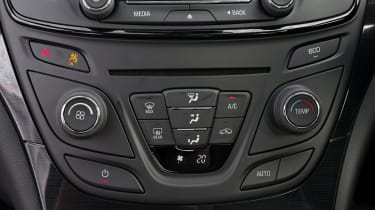
Automatic lights and wipers can be added to lower-spec Insignias as extras, as can Vauxhall’s auto-park system and front and rear cameras. The front camera pack option includes lane departure warning, adaptive cruise control and forward collision alert. Optional OnStar also alerts the emergency services automatically if the airbag deploys.
While all this kit hikes the price, it keeps the Insignia among the best cars in its class for safety equipment. Even so, modern rivals like the latest Ford Mondeo have definitely caught up in this regard, and offer things like city braking, which Vauxhall does not.
Warranty
Vauxhall used to supply a unique lifetime warranty, but that was scrapped for new cars as of January 2015. Instead, the company currently offers a three-year, 60,000-mile warranty that’s much more in line with industry averages. It’s still possible to extend the warranty, at extra cost, up to 100,000 miles. Brands offering more generous warranties include Toyota (five years), Hyundai (five years) and Kia (seven years).
Servicing
The Insignia range benefits from 20,000-mile service intervals, which are longer than most cars, but to maintain the warranty you’ll still need to have a service carried out at least once a year. Optional service plans can spread the cost of dealer maintenance, and offer discounts on wear and tear items.

